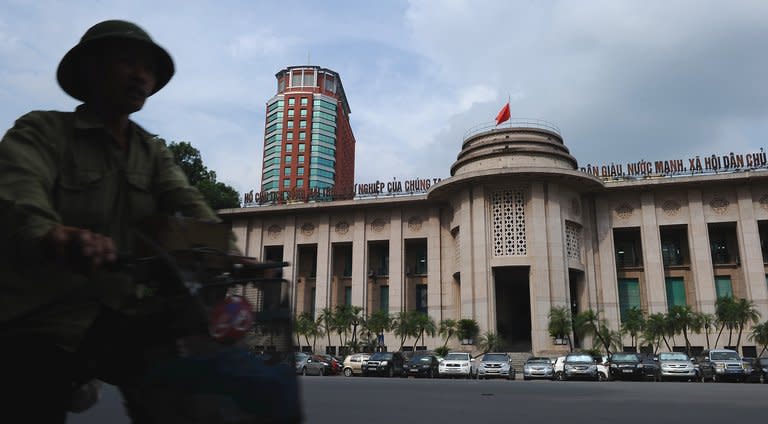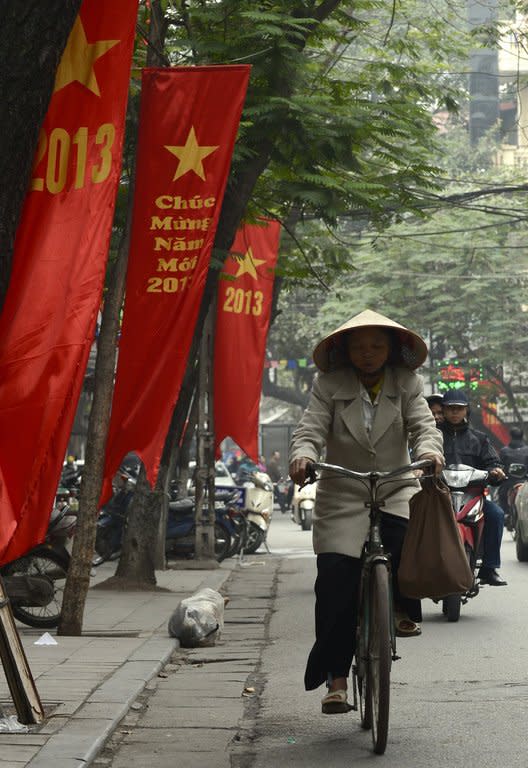Vietnam's state sector a 'cancer' in economy
Opaque, corrupt, inefficient -- Vietnam's state-run companies are used to criticism, but now they stand accused of creating a systemic economic crisis which the communist regime cannot fix. More than 25 years after it started a transition towards a market economy, the government is trying to unpick a web of state-owned firms, which have a stranglehold on the economy and are proving stubbornly resistant to reform. "The public sector is the Communist Party's biggest mistake," said Hanoi-based economist Nguyen Quang A, adding that the "long illness" of the public sector was causing a broader economic crisis. "The economy is in its worst situation since 1986," he told AFP, referring to a major economic crisis which precipitated free-market reforms. The state sector is "the spoiled child of different interest groups (who) do not want to reform the sector to protect their power... They are seeking to maintain its status at any price." Despite a string of interest rate cuts aimed at stimulating the economy, Vietnam's annual growth slowed to its weakest pace in 13 years in 2012, and resurgent inflation is seen as limiting the scope for further stimulus. Vietnam has more than 1,300 state-owned enterprises (SOEs). They account for 45 percent of the country's total investment, use 60 percent of commercial bank loans, and absorb some 70 percent of development aid. But they contribute just 30 percent of annual GDP growth according to figures from the Ministry of Planning and Investment made public in November. Some analysts argue that if one counts SOE subsidiaries and so-called private enterprises which are in reality controlled by top government officials, the state sector accounts for 70 percent of Vietnam's total economic activity. But the sector is not in good health. SOEs have racked up some $61 billion of debt which represents more than half of total public debt in Vietnam. Several of the SOEs have already collapsed in spectacular fashion, including shipping giants Vinashin -- which ran up $4.4 billion of losses -- and Vinalines, which has defaulted on payments of some $1.1 billion. Their downfalls have been used in particular by detractors of Prime Minister Ngyuen Tan Dung -- seen as a reformer when he took office in 2006, but now roundly blamed for the country's economic woes. Dung championed the SOEs as a path to economic prosperity, citing the example of South Korea's Chaebol. Experts say the SOEs have become expert at hiding their debts, have incomprehensible strategies, hazardous investments in non-core sectors which are cunningly designed to circumvent government regulations. The top officials running the companies frequently flaunt lifestyles incompatible with their official remuneration, fuelling public anger at the corruption, inefficiency and waste. "The crisis of public debts is an economic drama that has lasted five years already and is linked to the authority of the Communist Party," said Quang A. In the last few months, rumours have been multiplying about the weaknesses of a string of other major SOEs. The official media has singled out Electricity of Vietnam (EVN) and the coal giant Vinacomin as the next heavyweights heading for a collapse, only kept alive on a life-support drip of official favours and credit. Some 30 of the 85 largest SOEs have accumulated debts between three and 10 times larger than their capital according to Minister of Planning and Investment Bui Quang Vinh, speaking in December. "People intentionally violate the law purely for personal interest," he said, bringing up massive investments by several SOEs in sectors they were not authorised to operate in. Scapegoated for the sector's broader collapse, the ex-head of Vinashin has been sentenced to 20 years in prison, and the top officials at Vinalines are in prison awaiting trial. No systemic solution has been proposed to avoid repetition of their failures. Yet the Vietnamese model, a strange mix of "market economy with socialist orientation" has been discredited both at home and overseas. "Public enterprises have to beg for state subsidies to survive -- they have become a cancer in the economy," said one Vietnamese parliamentary on condition of anonymity. "Reform is too slow because it faces strong opposition from leaders and company directors. Billions of dollars have been lost. But hardly anyone has been brought to justice."




